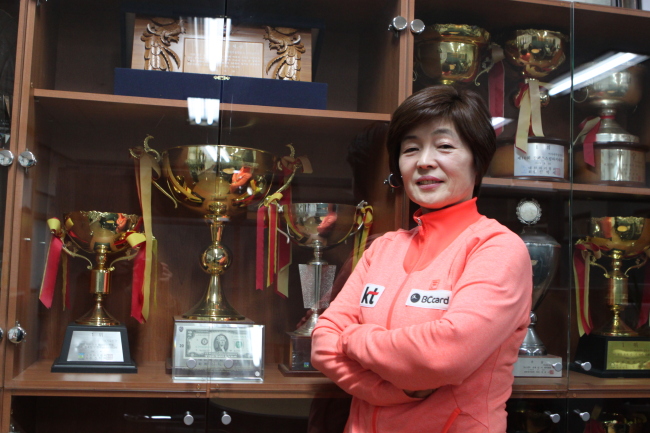[Herald Interview] 'Just go for it'
Field hockey legend Lim Gye-sook on playing the game again
By 원호정Published : Dec. 16, 2015 - 20:12
This is the second installment in a three-part series featuring athletes who help people transform their lives. – Ed.
In November 2010, Lim Gye-sook received the call of a lifetime from KT Sports, the sports unit of KT, Korea’s largest telecom, asking her to come back to the sport of women’s field hockey.
KT Sports wasn’t asking Lim to grab her hockey stick again and play on the field, but to lead a team of 11 young female players to victory.
Lim was apprehensive, as her glory days in the sport were in the 1980s. Although she was considered a Korean field hockey legend, having won the silver at the 1988 Olympics and gold at the 1986 Asian Games, she had not been on the field for 18 years since her retirement after the 1992 Barcelona Olympics. Lim was then nicknamed “The Fantastic Stick,” scoring at least one or two goals per game.
“I didn’t know anything about being a leader, or how to plan game strategies and techniques, let alone not having played the sport for 18 years before I was called back to be the head coach,” Lim, 51, said in an interview in her office at the Seongnam Sports Complex.
“But I said to myself, ‘Let’s just go for it and see where it takes you.’ You‘ll never know unless you try it, even if that is something new and challenging.”
This is also something Lim always tells her 11 young players to do -- try new things and always prepare for postretirement life.
She constantly reminds her players that one day they, too, will have to drop their hockey sticks and leave the field like she did at the age of 30. Lim said she was “lucky” to work for KT’s customer service at its Cheonan branch in South Chungcheong Province after retirement.
But not all of her players may be so fortunate after retirement.
Lim encourages her young players to study, go to college after practice or learn something they would be interested in doing for the rest of their lives after their hockey-playing days are over.
This is why she and her assistant coaches push the players to take risks on the field and create new moves and maneuvers to help them develop mindsets ready to take on new challenges.

“We may practice and play this game under a fixed set of rules, but in order for the players to come up with something creative, they need to think outside the box,” Lim said.
“In my days, we had to be absolutely obedient. This doesn’t work anymore in this age, which calls for stronger collaboration between coaches and players, creative thinking and risk-taking. Sports is very much like running a start-up.”
These qualities are a must today as rules of the game have changed to make it more intense and faster. The new rules allow teams to frequently change players during the 70-minute game. In the 1980s, the teams were only allowed to change up to two players during the entire game.
In this new age, Lim said she may draw the “big picture” or vision for the team, but she shares her responsibilities with her assistant coaches by drawing on their strengths, as well as their weaknesses.
She directs her players “softly,” telling them it is OK to make mistakes when trying something new as long as they learn and grow from them, while maintaining her “shared responsibility” leadership with her assistant coaches.
“I can’t do everything on my own. I rely on (assistant) coaches who are strong in strategy and techniques. This is a game of teamwork. So far, it has worked for me, the coaches and the team,” she said.
Last year, when KT Hockey Team earned the “triple crown” in a total of six domestic games, stands out as the best of her five years as head coach.
Lim won numerous recognitions for her leadership, including the Korea Women Sports Award last month and KOC Sports Award early this year.
“This year, we only won one game out of six. This tells me I have to further improve my communication with the players, which is always the key to successful teamwork.”
By Park Hyong-ki (hkp@heraldcorp.com)








![[Kim Seong-kon] Democracy and the future of South Korea](http://res.heraldm.com/phpwas/restmb_idxmake.php?idx=644&simg=/content/image/2024/04/16/20240416050802_0.jpg&u=)







![[KH Explains] Hyundai's full hybrid edge to pay off amid slow transition to pure EVs](http://res.heraldm.com/phpwas/restmb_idxmake.php?idx=652&simg=/content/image/2024/04/18/20240418050645_0.jpg&u=20240418181020)

![[Today’s K-pop] Zico drops snippet of collaboration with Jennie](http://res.heraldm.com/phpwas/restmb_idxmake.php?idx=642&simg=/content/image/2024/04/18/20240418050702_0.jpg&u=)